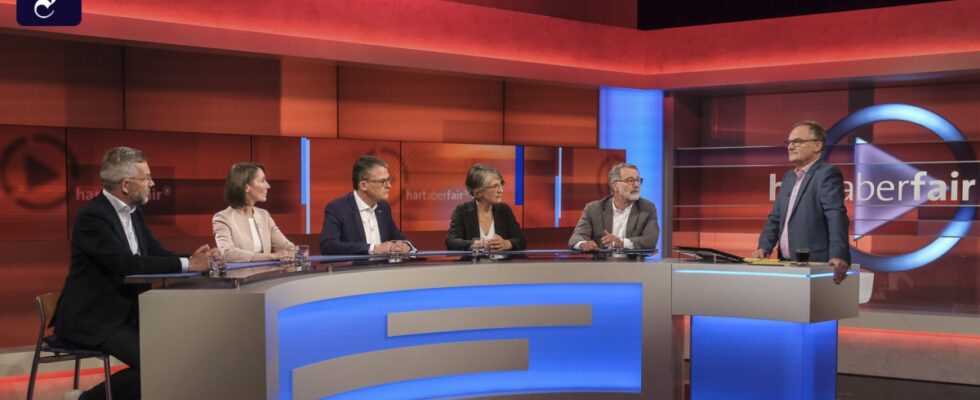An midday, Russian President Vladimir Putin inspected a parade and gave a speech – and of course “Hard but fair” then dealt with the difficult and obvious questions of what he said and what he didn’t say. And about what he wanted to communicate to whom and why. So it was, at least initially, about why Putin didn’t declare war, didn’t call for a general mobilization, why he didn’t do what the media had speculated about so extensively. And why, on the other hand, he did not send any signs of de-escalation. And then the airplane show was canceled – when one would have loved to have read the signs in the sky.
Gesine Dornblüth, Deutschlandfunk’s Russia expert, coolly answered the question about the planes (doesn’t he have any more? Or no more money for all the effort?) by saying that a strong wind had actually blown near Moscow. For the answers to all the other questions, one would have had to look into Putin’s head, which, if one tries, only provokes speculation with a lot of subjunctive and potentialis. For example, Roderich Kiesewetter, the CDU foreign policy officer, speculated that, to celebrate the anniversary of the Soviet Union’s victory over Nazi Germany, Putin could have simply declared the status quo a victory. Which may sound ludicrous, but it’s no crazier than all the nonsense about Nazis and NATO that the Russian people seem to believe in Putin’s propaganda.
How to read Putin’s face
The outside, the face, is easier to read than the inside of Putin’s head – this was pointed out by Michael Roth, the foreign policy expert of the SPD, who, after Wolfgang Merkel, the political scientist and co-signer of Alice Schwarzer’s open letter, once again called for a face-saving compromise for Putin pointed out that Putin does have a face. But that he couldn’t lose this face at all, because his power is so unlimited and his sovereignty of definition so great in Russia that nobody there would even dare to ask about the face.

Claudia Major heads the security policy research group of the Stiftung Wissenschaft und Politik (SWP) in Berlin.
:
Image: WDR/Oliver Ziebe
Before the broadcast, the first had brought a “focus” that had already dealt with the same questions – and at the latest when Marie-Agnes Strack-Zimmermann called for more military readiness there, viewers were ready to admit their own weariness. Not because Ms. Strack-Zimmermann said something wrong. But because she could have been on Frank Plasberg’s show just as well. And Michael Roth in her place. And because, as a conscientious viewer, you already know most of the possible statements made by the two.
But it has to be, again and again, as Wolfgang Merkel made clear in “Hart aber fair”, who with great stubbornness once again doubted everything that the others agreed on: that better weapons will ensure better negotiating positions. That everything had already been tried to reach a compromise. That the Ukrainians’ will to resist is really stronger than their fear of death. In doing so, he gave Roth and Kiesewetter, but above all Gesine Dornblüth and the military expert Claudia Major, a wonderful opportunity to spell out once again that Ukraine had made a compromise offer. And in response the massacres in the Kyiv area got. That Ukraine is not about choosing between war and a ceasefire. But about the one between war and annihilation, the obliteration of the state and culture. Merkel, as all polls show, speaks and doubts for a section of Germans that should be taken seriously.
Nevertheless, one has already read, heard, perhaps even thought about all of this – but television probably has to keep showing these arguments, all these repetitions and redundancies: because otherwise the people might get used to this monstrous and criminal war after all, and at best be annoyed because of it could be felt because prices are rising. Although Professor Merkel’s concern about the disappointment, indeed the desperation, of Putin and his people can probably only be alleviated with the most drastic descriptions of the crimes committed by these people. A generality is not a therapy group.
The deterrent works
Sensationalism was already involved when Frank Plasberg showed the notorious video in which Russian TV people rave about the fact that Russian nuclear missiles only need 106 seconds from Kaliningrad to Berlin. And it was all the cooler how Ms. Major took the fright out of this threat. The deterrence works, she explained, which is evident from the fact that even now, during the war, the Russians informed the Americans before they tested a missile. And it works both ways – neither did the Russians violate NATO territory, nor did NATO really intervene in the war. Because nuclear powers could not go to war with one another. The intention of the threat was not to really consider the destruction of Berlin. The intention is to spread fear, which also works, as one can not only study Wolfgang Merkel as an example.
That was clear, competent, precise. And at the same time it sounds pleasantly civil when Major designates a surname and not a military rank.
